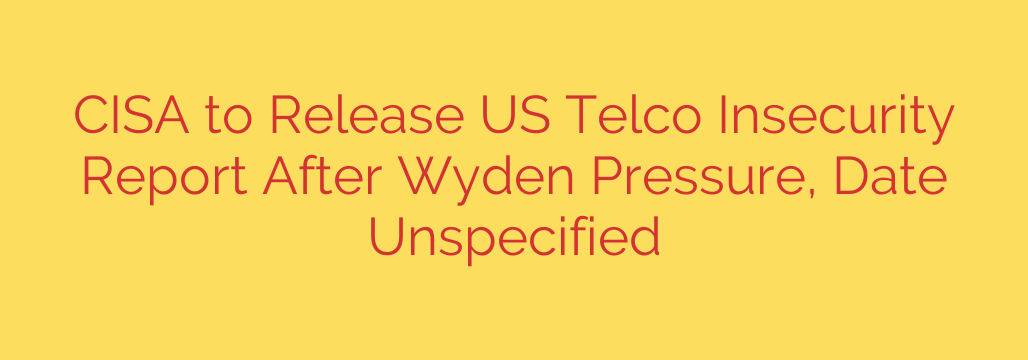
CISA to Reveal Major Security Flaws in U.S. Mobile Networks
Your mobile phone may not be as secure as you think. Foundational vulnerabilities within the U.S. telecommunications infrastructure have long exposed Americans to surveillance, and a forthcoming government report is set to bring these critical security gaps into the spotlight.
The U.S. Cybersecurity and Infrastructure Security Agency (CISA) has confirmed it will release a detailed report on the systemic insecurities plaguing the nation’s mobile networks. This move comes after sustained pressure from lawmakers, particularly Senator Ron Wyden, who have warned about these dangers for years.
At the heart of the issue are legacy protocols that form the backbone of mobile communications. These systems, known as Signaling System 7 (SS7) and the Diameter protocol, are essential for routing calls and messages between different carrier networks. However, they were designed decades ago without modern security features in mind.
What Are the Dangers of SS7 and Diameter Flaws?
These protocols harbor significant vulnerabilities that can be exploited by malicious actors, including foreign governments and sophisticated hackers. By gaining access to the SS7 or Diameter networks, attackers can carry out a range of invasive activities with alarming ease.
The primary threats include:
- Real-time location tracking of any mobile phone user without their knowledge.
- Interception of phone calls and text messages, including one-time passcodes used for two-factor authentication (2FA).
- Denial of service attacks, which can prevent a user from making or receiving calls and messages.
These are not theoretical threats. Security researchers have repeatedly demonstrated how these exploits can be used to undermine user privacy and security on a massive scale. The fact that these vulnerabilities persist represents what Senator Wyden has described as “long-standing national security risks.”
A Push for Transparency and Accountability
For years, the federal government and telecom carriers have been aware of these security shortcomings. The upcoming CISA report is expected to provide an unprecedented level of detail about the extent of the problem, analyzing how U.S. mobile networks are susceptible to these exploits.
The report will finally offer a public assessment of the security posture of U.S. telecommunications infrastructure. It aims to shed light on which carriers have implemented recommended security measures and where critical gaps remain. This transparency is a crucial first step toward holding carriers accountable and pushing for industry-wide security upgrades to protect American consumers and national security interests.
While the exact release date has not been specified, the confirmation of the report’s publication marks a significant victory for privacy advocates and a critical moment for the telecom industry.
How to Protect Yourself from Mobile Network Vulnerabilities
While carriers and the government work to address these deep-seated infrastructure issues, there are steps you can take to enhance your personal mobile security.
Use Encrypted Messaging Apps: Rely on end-to-end encrypted applications like Signal or WhatsApp for sensitive conversations instead of traditional SMS messages. This encryption protects the content of your messages even if the network itself is compromised.
Avoid SMS-Based 2FA: Whenever possible, use app-based authenticators (like Google Authenticator or Authy) or physical security keys for two-factor authentication. Because SMS messages can be intercepted, SMS-based 2FA is the least secure option.
Use a Reputable VPN: A Virtual Private Network (VPN) encrypts your internet traffic, making it much harder for anyone on the network to snoop on your online activity. While it won’t protect against SS7-based call interception, it adds a powerful layer of security for your data.
Be Cautious on Public Wi-Fi: Avoid sending sensitive information when connected to public Wi-Fi networks, as they are often targeted by hackers. If you must use them, ensure your VPN is active.
The forthcoming CISA report will be a critical call to action for the U.S. government and mobile carriers to modernize their infrastructure and safeguard the privacy of all Americans.
Source: https://go.theregister.com/feed/www.theregister.com/2025/07/29/cisa_wyden_us_telecoms_insecurity_report/








